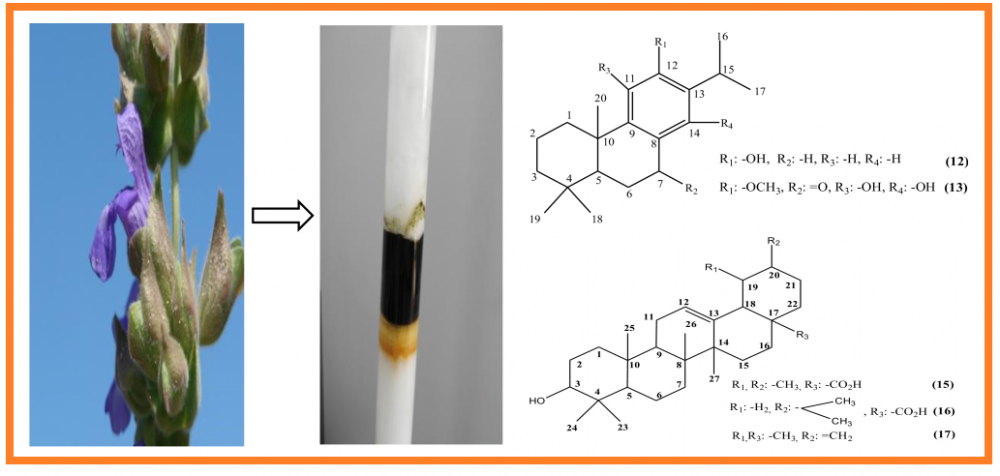JOURNAL 1933
Records of Natural Products
Year: 2021 Issue: 6 November-December (Special Issue Dedicated to the Memory of Professor Ayhan Ulubelen)
p.585 - 592
Viewed 2362 times.
GRAPHICAL ABSTRACT

ABSTRACT
In the current study, the ethanol extracts prepared from the aerial parts and roots of an endemic species, Salvia cerino-pruinosa Rech. f. var. cerino-pruinosa were fractionated on silica gel columns and tested for determination of their antioxidant activity using DPPH free radical and ABTS cation radical scavenging, and cupric reducing antioxidant capacity (CUPRAC) test assays. Twenty known secondary metabolites were isolated from the active antioxidant fractions; rosmarinic acid (1), chlorogenic acid (2), caffeic acid (3), 4-hydroxybenzoic acid (4), benzoic acid (5), luteolin 7-O-glucoside (6), bis-(2-ethylhexyl)benzene-1,2-dicarboxylate (7), salvianolic acid A (8), salvianolic acid B (9), 7-acetylroyleanone (10), 6,7-dehydroroyleanone (11), ferruginol (12), inuroyleanol (13), 12-hydroxy-6,7-secoabieta-8,11,13-triene-6,7-dial (14), ursolic acid (15), oleanolic acid (16), taraxasterol (17), lupenone (18), β-sitosterol (19), and stigmasterol (20). Rosmarinic acid, which was obtained from the aerial parts, was found to be the best antioxidant compound among the isolated secondary metabolites in DPPH free radical and ABTS cation radical scavenging, and CUPRAC assays (IC50: 1.20±0.04 µg/mL, IC50: 1.74±0.06 µg/mL, A0.5: 1.22±0.02 µg/mL, respectively). Chlorogenic and caffeic acids, luteolin 7-O-glucoside, salvianolic acids A and B, and inuroyleanol exhibited also high antioxidant activity in the mentioned assays.
KEYWORDS- Salvia cerino-pruinosa
- isolation
- secondary metabolite
- antioxidant
SUPPORTING INFORMATION
Supporting Information
Bioguided Isolation of Secondary Metabolites from Salvia cerino-pruinosa Rech. f. var. cerino-pruinosa
Download File Supplementary material.doc (5.54 MB)